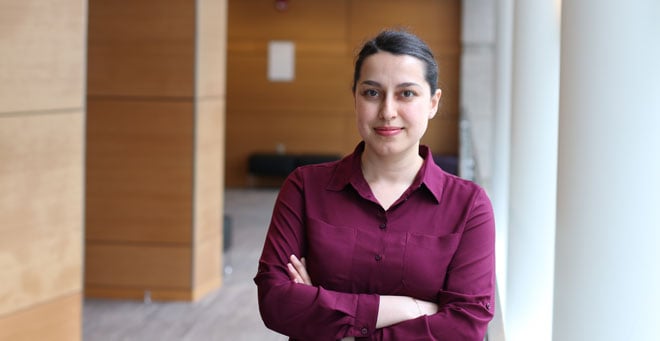 |
|
|
Hatem Elif Kamber Kaya will accept her PhD on Sunday, June 4. |
Like all good scientists, Hatem Elif Kamber Kaya learned firsthand that persistence and resiliency are essential elements of discovery. The path to her dissertation wasn’t a straight line, but it was successful, and Kamber Kaya likes to say she earned a master’s of life at graduate school along the way. On Sunday, June 4, she will be one of 37 students from the Graduate School of Biomedical Sciences to accept her PhD.
Kamber Kaya overcame obstacles such as the moving of her first mentor’s lab out of state and a mismatch with her second lab. When she finally landed in the right lab, she found her research home and gained the confidence to take on a project that was outside of her comfort zone.
Kamber Kaya arrived in Worcester from her native Turkey in 2010, fresh from earning her undergraduate degree in molecular biology and genetics at Izmir Institute of Technology, and was excited to be pursuing her lifelong dream of a career in science.
After adjusting to life in the United States and life as a graduate student, she set out with her peers to find the right lab for her thesis research. But when she experienced setbacks, she sought the resources of the GSBS and began to work with Mary Ellen Lane, PhD, associate dean for curriculum and academic affairs in the GSBS and associate professor of neurobiology.
“Luckily, UMass Medical School has very effective career development and counseling services. I’m thankful that I met Dr. Lane at that time,” said Kamber Kaya. “She encouraged me to take my time and reassured me that everything would work out. She’s been a great mentor.”
Kamber Kaya was planning to continue her studies in molecular biology and genetics, but she took advantage of an opportunity to study fly genetics with Andreas Bergmann, PhD, professor of molecular, cell & cancer biology. It was an area of research she was not experienced with but she soon realized that the skills she developed in her previous labs, coupled with her knowledge of molecular biology and biochemistry, were a good fit for the research.
Kamber Kaya’s thesis research was on regulation of apoptosis in Drosophila. Apoptosis, or programmed cell death, is the planned demise for many cells in an organism; when this planning goes awry, a range of diseases can follow. Apoptosis in organisms from flies to humans is controlled by a family of enzymes called caspases, which can execute the cascade of events toward cell death, or regulate other cellular functions short of it. Caspase activity can be kept under control by a cellular management system called “ubiquitylation,” which is intricate, complex—and often, different for each caspase pathway. Kamber Kaya’s research identified that a caspase in Drosophila can be modified by ubiquitylation that manages both its apoptotic and non-apoptotic functions. Her research shed light on a previously unknown mechanism and an unusual regulatory act for non-apoptotic functions of caspases.
“I demonstrated that K78 mono-ubiquitylation plays a role in Drosophila caspase Dronc’s non-apoptotic functions, which may not require its catalytic activity but may be important to the survival of the fly,” said Kamber Kaya.
The results of her research were published in PLOS Genetics earlier this year.
She credits Dr. Bergmann with helping her develop as a scientist. “Dr. Bergmann has always supported me and my ideas. He guided me through tough times and listened to me when my ideas were different from his. He’s has been a great mentor to me,” she said.
Despite some bumps in the road, Kamber Kaya has no regrets. “I feel confident and strong because of the things that I’ve gone through.” she said.
Related story on UMassMedNow:
Kamber Kaya and Hall representing women in science at The Allied Genetics Conference